英语句法基本知识
英语语法知识
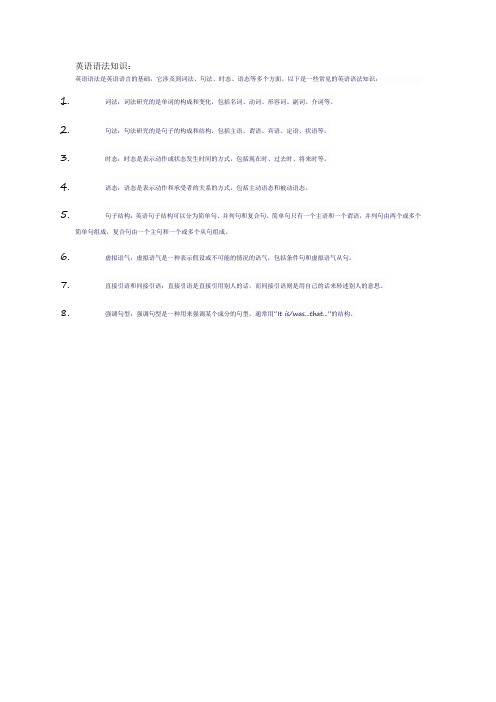
英语语法知识:
英语语法是英语语言的基础,它涉及到词法、句法、时态、语态等多个方面。
以下是一些常见的英语语法知识:
1.词法:词法研究的是单词的构成和变化,包括名词、动词、形容词、副词、介词等。
2.句法:句法研究的是句子的构成和结构,包括主语、谓语、宾语、定语、状语等。
3.时态:时态是表示动作或状态发生时间的方式,包括现在时、过去时、将来时等。
4.语态:语态是表示动作和承受者的关系的方式,包括主动语态和被动语态。
5.句子结构:英语句子结构可以分为简单句、并列句和复合句。
简单句只有一个主语和一个谓语,并列句由两个或多个
简单句组成,复合句由一个主句和一个或多个从句组成。
6.虚拟语气:虚拟语气是一种表示假设或不可能的情况的语气,包括条件句和虚拟语气从句。
7.直接引语和间接引语:直接引语是直接引用别人的话,而间接引语则是用自己的话来转述别人的意思。
8.强调句型:强调句型是一种用来强调某个成分的句型,通常用“It is/was...that...”的结构。
英语句子成分及简单句5种基本句型知识分享
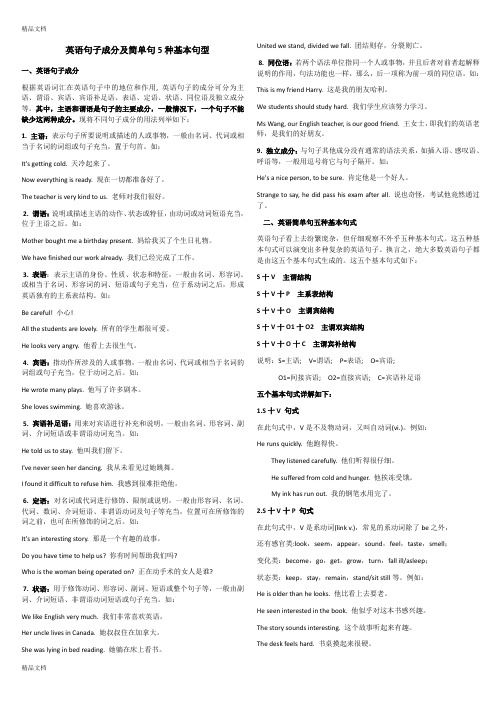
英语句子成分及简单句5种基本句型一、英语句子成分根据英语词汇在英语句子中的地位和作用, 英语句子的成分可分为主语、谓语、宾语、宾语补足语、表语、定语、状语、同位语及独立成分等。
其中,主语和谓语是句子的主要成分,一般情况下,一个句子不能缺少这两种成分。
现将不同句子成分的用法列举如下:1. 主语:表示句子所要说明或描述的人或事物,一般由名词、代词或相当于名词的词组或句子充当,置于句首。
如:It's getting cold. 天冷起来了。
Now everything is ready. 现在一切都准备好了。
The teacher is very kind to us. 老师对我们很好。
2. 谓语:说明或描述主语的动作、状态或特征,由动词或动词短语充当,位于主语之后。
如:Mother bought me a birthday present. 妈给我买了个生日礼物。
We have finished our work already. 我们已经完成了工作。
3. 表语:表示主语的身份、性质、状态和特征,一般由名词、形容词、或相当于名词、形容词的词、短语或句子充当,位于系动词之后,形成英语独有的主系表结构。
如:Be careful! 小心!All the students are lovely. 所有的学生都很可爱。
He looks very angry. 他看上去很生气。
4. 宾语:指动作所涉及的人或事物,一般由名词、代词或相当于名词的词组或句子充当,位于动词之后。
如:He wrote many plays. 他写了许多剧本。
She loves swimming. 她喜欢游泳。
5. 宾语补足语:用来对宾语进行补充和说明,一般由名词、形容词、副词、介词短语或非谓语动词充当。
如:He told us to stay. 他叫我们留下。
I've never seen her dancing. 我从未看见过她跳舞。
(完整版)高中英语句法知识汇总--
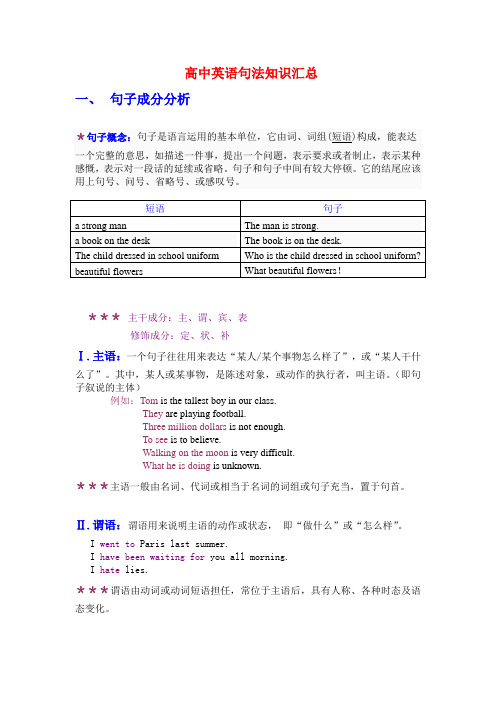
高中英语句法知识汇总一、句子成分分析*句子概念:句子是语言运用的基本单位,它由词、词组(短语)构成,能表达一个完整的意思,如描述一件事,提出一个问题,表示要求或者制止,表示某种感慨,表示对一段话的延续或省略。
句子和句子中间有较大停顿。
它的结尾应该用上句号、问号、省略号、或感叹号。
***主干成分:主、谓、宾、表修饰成分:定、状、补Ⅰ.主语:一个句子往往用来表达“某人/某个事物怎么样了”,或“某人干什么了”。
其中,某人或某事物,是陈述对象,或动作的执行者,叫主语。
(即句子叙说的主体)例如:Tom is the tallest boy in our class.They are playing football.Three million dollars is not enough.To see is to believe.Walking on the moon is very difficult.What he is doing is unknown.***主语一般由名词、代词或相当于名词的词组或句子充当,置于句首。
Ⅱ.谓语:谓语用来说明主语的动作或状态,即“做什么”或“怎么样”。
I went to Paris last summer.I have been waiting for you all morning.I hate lies.***谓语由动词或动词短语担任,常位于主语后,具有人称、各种时态及语态变化。
III.宾语:谓语动词的动作的承受者,即动作的对象或内容。
I love you.I study Chinese.He wrote many plays.I taught him a lesson yesterday.Can you show me your photo?***许多及物动词后可以有两个宾语(双宾语):直接宾语和间接宾语。
直接宾语表示动作的承受者,通常是物;间接宾语表示动作对谁或为谁而做,通常是人。
专升本英语核心语法(一)句法知识点汇总
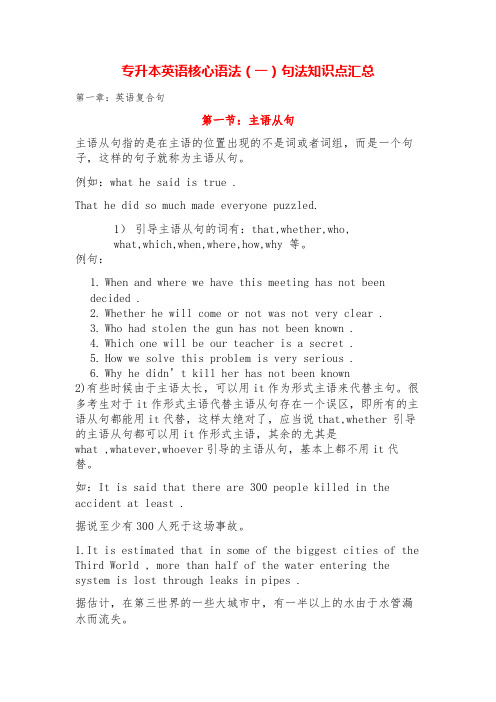
专升本英语核心语法(一)句法知识点汇总第一章:英语复合句第一节:主语从句主语从句指的是在主语的位置出现的不是词或者词组,而是一个句子,这样的句子就称为主语从句。
例如:what he said is true .That he did so much made everyone puzzled.1)引导主语从句的词有:that,whether,who,what,which,when,where,how,why 等。
例句:1.When and where we have this meeting has not beendecided .2.Whether he will come or not was not very clear .3.Who had stolen the gun has not been known .4.Which one will be our teacher is a secret .5.How we solve this problem is very serious .6.Why he didn’t kill her has not been known2)有些时候由于主语太长,可以用it作为形式主语来代替主句。
很多考生对于it作形式主语代替主语从句存在一个误区,即所有的主语从句都能用it代替,这样太绝对了,应当说that,whether 引导的主语从句都可以用it作形式主语,其余的尤其是what ,whatever,whoever引导的主语从句,基本上都不用it代替。
如:It is said that there are 300 people killed in the accident at least .据说至少有300人死于这场事故。
1.It is estimated that in some of the biggest cities of the Third World , more than half of the water entering the system is lost through leaks in pipes .据估计,在第三世界的一些大城市中,有一半以上的水由于水管漏水而流失。
(完整版)英语语法入门基础知识

语法基础知识目录一、字母与语音 (1)二、词法 (3)三、句法 (12)四、时态 (16)语法基础知识一、字母与语音ɔ 主要字母组合的发音字母组合发音例词aralcar,bar,far,star small [a:][ɔ:]ayea play [ei][i :][ei]tea,beat,read,eat break,great bread [e]eeei[i :][ei]bee,see,Lee,jeep eight oo[u ]cook,foot,look,classroom boot,food,gooes,room coat,boat,goat oil [u :]oaoiu [ə ]ɔ[ i ]ir:[ə ]bird ooroyow[ :]door ɔɔ[ i ]boy [au ][ əu ][au ]how Know ouor house [ə:][ə]work,world,worse doctor,visitor,tractor morning [ɔ:]er[ə]sister,brother,mother,father her,term [ə:]irəbird,shirt,third,girl beer,deer,cheer turn [ :][ ə]eeruri [ə:][e ə]eirereeartheir [εə][i ə]there,where hear,fear [εə][εə][θ][ð]pear,bear,wear chair,hair airththree,thirty,thin,thousand this,those,these,they chick,click,cock,clockck [k ]0给大家推荐一个英语微信群Empty Your Cup英语微信群是目前学习英语最有效的方法,群里都是说英语,没有半个中文,而且规则非常严格,是一个超级不错的英语学习环境,群里有好多英语超好的超牛逼的人,还有鬼佬和外国美眉。
英语语法:句法
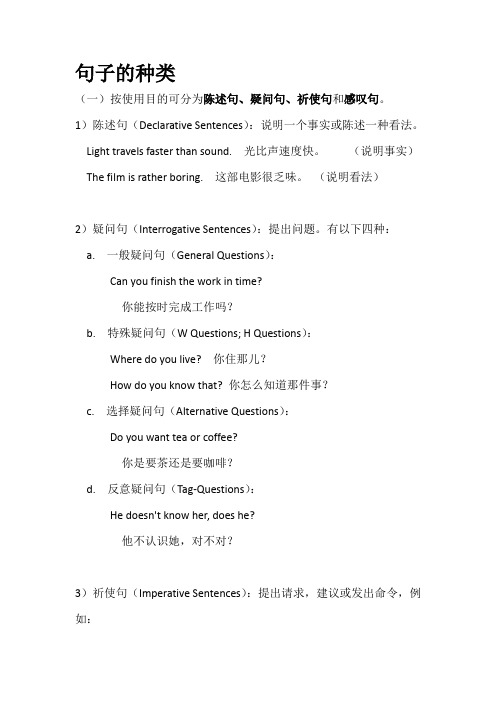
句子的种类(一)按使用目的可分为陈述句、疑问句、祈使句和感叹句。
1)陈述句(Declarative Sentences):说明一个事实或陈述一种看法。
Light travels faster than sound.光比声速度快。
(说明事实)The film is rather boring.这部电影很乏味。
(说明看法)2)疑问句(Interrogative Sentences):提出问题。
有以下四种:a.一般疑问句(General Questions):Can you finish the work in time?你能按时完成工作吗?b.特殊疑问句(W Questions; H Questions):Where do you live?你住那儿?How do you know that? 你怎么知道那件事?c.选择疑问句(Alternative Questions):Do you want tea or coffee?你是要茶还是要咖啡?d.反意疑问句(Tag-Questions):He doesn't know her, does he?他不认识她,对不对?3)祈使句(Imperative Sentences):提出请求,建议或发出命令,例如:Sit down, please.请坐。
Don't be nervous!别紧张!4)感叹句(Exclamatory Sentences):表示说话人惊奇、喜悦、愤怒等情绪,例如:What good news it is!多好的消息啊!(二)句子按其结构可以分为以下三类:1)简单句(Simple Sentences):只包含一个主谓结构句子叫简单句,例如:She is fond of collecting stamps.她喜欢集邮。
(主)(谓)2)并列句(Compound Sentences):包含两个或两个以上主谓结构的句子叫并列句,句与句之间通常用并列连词或分号来连接,例如:The food was good, but he had little appetite.(主)(谓)(主)(谓)食物很精美,但他却没什么胃口。
英语常用句法介绍:陈述句,疑问句

英语常用句法介绍:陈述句,疑问句1.陈述句(1)肯定句:是指用肯定的语气来陈述的句子,如:I’m a student. She is a doctor. He works in a hospital.There are four fans in our classroom. He will eat lunch at 12:00. I watched TV yesterday evening.(2)、否定句:含有否定词或表示否定意义词的句子,如:I’m not a student. She is not (isn’t) a doctor.He does not (doesn’t) work in a hospital. There are not (aren’t) four fans in our classroom.He will not (won’t) eat lunch at 12:00. I did not (didn’t) watch TV yesterday evening.2. 疑问句一般疑问句:是指询问事实的句子,此类句子必须用“yes”,或“no”来回答。
特殊疑问句:以特殊疑问词(what , where , who , which , when , whose , why , how等)开头引导的句子。
此类句子应该问什么就答什么,不能用“yes 、no”来回答。
3.There be句型There be 句型与have, has的区别1、There be 句型表示:在某地有某物(或人)2、在there be 句型中,主语是单数,be 动词用is ; 主语是复数,be 动词用are ; 如有几件物品,be 动词根据最*近be 动词的那个名词决定。
3、there be 句型的否定句在be 动词后加not , 一般疑问句把be 动词调到句首。
4、there be句型与have(has) 的区别:there be 表示在某地有某物(或人);have(has) 表示某人拥有某物。
英语的句法
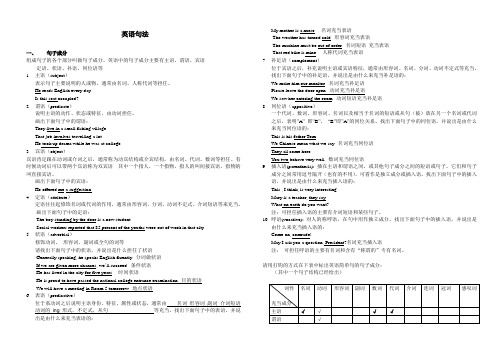
英语句法一、句子成分组成句子的各个部分叫做句子成分。
英语中的句子成分主要有主语、谓语、宾语定语、状语、补语、同位语等1.主语(subject)表示句子主要说明的人或物,通常由名词、人称代词等担任。
He reads English every day.Is this seat occupied?2.谓语(predicate)说明主语的动作、状态或特征,由动词担任。
画出下面句子中的谓语:They live in a small fishing village.That job involves travelling a lot.He took up drama while he was at college.3.宾语(object)宾语肯定跟在动词或介词之后,通常称为动宾结构或介宾结构,由名词、代词、数词等担任。
有时候动词后可以带两个宾语称为双宾语. 其中一个指人,一个指物,指人的叫间接宾语,指物的叫直接宾语。
画出下面句子中的宾语:He offered me a suggestion.4.定语(attribute)定语往往起修饰名词或代词的作用,通常由形容词、分词、动词不定式、介词短语等来充当。
画出下面句子中的定语:The boy standing by the door is a new student.Social workers reported that 85 percent of the youths were out of work in that city.5.状语(adverbial)修饰动词、形容词、副词或全句的词等请找出下面句子中的状语,并说出是什么担任了状语Generally speaking, he speaks English fluently. 分词做状语If we are given more chances, we’ll succeed. 条件状语He has lived in the city for five years. 时间状语He is proud to have passed the national college entrance examination. 目的状语We will have a meeting in Room 5 tomorrow. 地点状语6.表语(predicative)出是由什么来充当表语的:My mother is a nurse. 名词充当表语The weather has turned cold. 形容词充当表语The machine must be out of order. 名词短语充当表语That red bike is mine. 人称代词充当表语7.补足语(complement)位于宾语之后,补充说明主语或宾语特征,通常由形容词、名词、分词、动词不定式等充当。
- 1、下载文档前请自行甄别文档内容的完整性,平台不提供额外的编辑、内容补充、找答案等附加服务。
- 2、"仅部分预览"的文档,不可在线预览部分如存在完整性等问题,可反馈申请退款(可完整预览的文档不适用该条件!)。
- 3、如文档侵犯您的权益,请联系客服反馈,我们会尽快为您处理(人工客服工作时间:9:00-18:30)。
英语句法基本知识 一. 英语基本句型 I. 主语+系动词(linking verb)+表语 ◆⑴表示主语的状态、特征合身份的系动词be,look,seem,appear ,feel,smell,taste,sound; ★常见的系动词有 ◆⑵表示主语从一种状态到另一种状态,但侧重于转变后的结果的系动词become,turn ,come。go,get,grow,fall,prove; ◆⑶表示主语继续或保持某种身份、特征或状态的系动词keep,remain,stay,stand,lie, hold;
★常用作表语的词有:名词, 形容词, 非谓语动词, 介词短语, 从句等。如: 1.Seeing is believing. (_______ 充当主语和表语) 2.To see is to believe. (_______ 充当主语和表语) 3.She is disappointed at the disappointing news. 4.It doesn’t look as if we’ll be moving after all. 看起来我们还是不能搬迁。 5.The classroom looks amazing. 6.That looks like an amazing classroom. That looks an amazing classroom. 7. brilliant. It sounded /seemed like a brilliant idea. a brilliant idea. 8.It always seemed /sounded as though they would get married. 9.I seem to have left my book at home. 10.It seems that we still have a long way to go to catch up with the developed countries.要赶上发达国家我们似乎还有好长一段路要走。 11.There seems no need to be nervous about the first day at Senior High. 12.She didn’t appear embarrassed at the embarrassing moment.. 13.The retired worker appears an enthusiastic person. 那个退休工人似乎是个热心肠。 14.She appears to be in her late thirties. 15.It appears (that) there has been some misunderstanding between us. There appears to have been some misunderstanding between us. 看来我们之间一直有误会 16.You’ll feel better after a good night’s sleep. 17.Foreign guests feel amazed at the rapid development of China. 外宾对中国的快速发展感到惊叹。 18.Luckily, I was feeling in a good mood. 19.Standing there on the stage I felt a complete fool. 站在台上我感觉自己是十足的傻瓜。 20.I felt like a complete fool. 21.Her head felt as if / though it would burst. 22.This wallet feels (to me) like leather. 我觉得这钱包是皮的。 23.It will be difficult for him to become a doctor. It will be difficult for him to turn doctor. 24.She turns 21 in June. 25.His dream of becoming President has come true. 26.Something has gone wrong with our TV. 27.You’ll soon get used to the climate here. 28.We ought to go; it’s getting late. 29.They plan to get married in the summer. get angry/bored/hungry/fat/dressed/undressed 30.As time went on he grew more and more patient. 31.Mother had fallen asleep on the sofa before I got home. 32.At the teacher’s entry everyone fell silent. 33.This book will prove (to be) of great use to you in your studies. 这本书将来会证明对你的学习很有用。
34.It is also bad manners to keep silent when teachers ask you questions. 35.Train fares are likely to remain unchanged. 火车票价很可能保持不变。 36.In spite of their quarrel, they remain the best of friends. 尽管他们争吵过,他们仍是好朋友。 remain silent/standing/seated/untouched 37.He never stays angry for long. 38.The store stays open until late on Thursday. 39.The house stood empty for a long time. 40.My hometown lies on the coast. 41.The same argument doesn’t hold good in all cases. 同一论点并非对所有情况都适用。 42.What he said about you also holds true for the other comrades.
II. 主语+动词(intransitive verb) 这种句型中的谓语动词是不及物动词,没有直接宾语,但常带有状语。如:
1. The smell disappeared quite quickly. 2. He behaves in a serious and polite manner in his maths lessons. 他在数学课上表现得严肃而有礼貌。
III. 主语+动词(transitive verb)+宾语 这一句型中的谓语动词是及物动词,它必须带有自己的宾语。在英文中,当一个动词(包括单个动词和动词短语)作及物动词用时,它必须要有自己的宾语(除非宾语在上下 文里很明确地提到过,为避免不必要的重复,才会省去),否则会视为“句子不完整”。如:
1. She has the biggest smile in the world. 2. We’ are studying Chinese, maths, English and so on this term. IV. 主语+动词+间接宾语+直接宾语 A:接双宾语~ sb. sth.的动词,可转换为~ sth. to sb. 的:give, bring , take , send , pass ,hand , show , leave , lend , rent , offer , pay , owe , return , read , tell , write , promise , recommend B:接双宾语~ sb. sth.的动词,可转换为~ sth. for sb. 的:get , buy , cook , order , make , find , draw , spare , do sb. a favordo a favor for sb. 注:do sb. good/harmdo good/harm to sb. eg: 1. Will you rent me this television? Will you rent this television to me? 2. The company offered me a job. The company offered a job to me. 3. You haven’t paid me the money you owe me. You haven’t paid the money you owe me to me. 4. He owes his father £50. He owes £50 to his father. 5. Please return me my $100. Please return my $100 to me. 6. Please read us a story. Please read a story to us. 7. The firm promised. The workers a wage increase. The firm promised a wage increase to the workers 8. I have promised my wife a trip to Hongkong. I have promised a trip to Hongkong to my wife. 9. Can you recommend me a good novel? Can you recommend a good novel to me? 你能推荐一本好小说给我吗?
10. Can I get you a drink? Can I get a drink for you? 11. He bought me a gift on my birthday. He bought a gift for me on my birthday. 12. Mother cooks me my dinner every day. Mother cooks my dinner for me every day. 13. He ordered himself three shirts. He ordered three shirts for himself. 14. I made myself a cup of coffee. I made a cup of coffee for myself. 15. Will you please spare me a few minutes? Will you please spare a few minutes for me? 15. Will you please do me a favor? Will you please do a favor for me?
